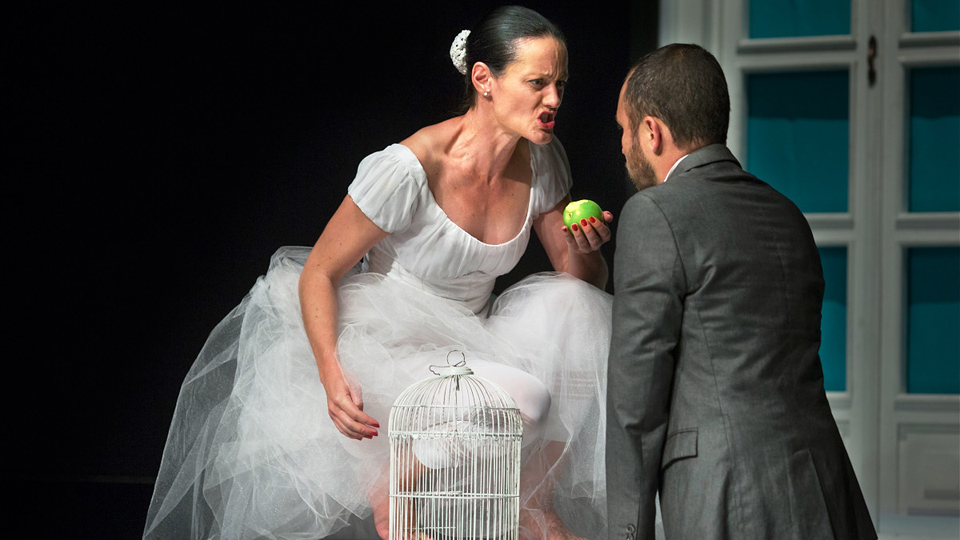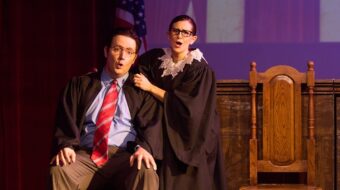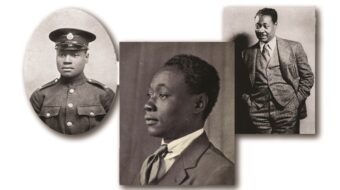
LOS ANGELES — Culture Clash, the L.A.-based three-man team of political satirists, formed part of the more than two-week-long Encuentro de las Américas Latinx theater festival that ended Nov. 19. Their intermissionless show, Culture Clash: An American Odyssey (seen Nov. 11), recapitulated highlights of some of their past efforts, but always with an eye to today’s immediacy. At some point in the future, cultural anthropologists will have a field day dissecting their up-to-date humor and mordant observations about society. Little escapes their rapier thrusts. Politicians, pedants, poets, professors and prudes, even clueless liberal sympathizers, beware! You may soon become a Culture Clash target at a theater near you.
Richard Montoya, Ric Salinas and Herbert Sigüenza have been performing together since May 5 (Cinco de Mayo), 1984. After 30-odd years they have become a much beloved pillar of Chicano consciousness. Known primarily for their comedy sketches ranging across a broad swath of Latinx life and its intersection with the rest of America, they have also produced several plays, including , Zorro in Hell, SF: The Mexican Bus Mission Tour with CC!, and Chavez Ravine, which probes deep into the history of an old Chicano community in L.A. not far from downtown which was ripped up to create Dodger Stadium.
Four of their full-length plays have been collected in the volume Culture Clash: Life, Death and Revolutionary Comedy.
The “odyssey” on view at the Los Angeles Theatre Center mixed a savvy brew of material about life in America that the troupe most wanted audiences to experience—especially, I think, visiting actors from other parts of Latin America who were in attendance. Those theatre folk from south of the border—just in case they still entertained any illusions about the beautiful, progressive U.S. of A.—got woke to a reality of what’s going down along the border and in Latinx communities here. All the characters are played by the three versatile performers in various costumes and wigs.
The show opens with Julie (Montoya) straddling the border in a kind of no man’s land. He calls himself a former “profesora,” (the feminine form for teacher), mashing up for satire the current debate over transgender identity. “What pronoun shall we use?” ask a pair of well-meaning but basically witless, privileged humanitarians sent out by their church to interview border crossers.
Julie poses the question, What would you do if an emaciated hungry Jesus walked through the Sonoran desert into the U.S.? All the Christian pieties would disappear instantly. He’d be incarcerated, then deported.
The liberals earnestly ask him, “What do you want?”
“Can you get me Hamilton tickets?” That show is running in L.A. now and tickets are next to impossible to get even if it were possible to afford them.
Salinas portrays Junior, a Nuyorican from New York’s Loisaida (Lower East Side for the culturally uninformed). Junior is a former addict who describes himself racially as Spanish, Black and Taino, and acknowledges the help he’s received from his homies in the gay community. He now divides his time between AA and the salsa clubs. For the edification of the audience he offers his interpretation of salsa as performed by people from the Dominican Republic, Mexico, Central America, Cuba and Puerto Rico. Although meant to be hilariously funny, and it is, at the same time it’s a little slice of New York Latinx mores that says much about those cultures.
A quiet break comes with former Sheriff Joe Arpaio (Montoya) sitting at his desk and reading selections from his absurd memoirs, a hodgepodge of right-wing paranoia attacking every liberal idea in sight. This passage was overlong; I kept thinking, “This would work better as a satirical piece in The New Yorker.”
Another sketch has Montoya coming from California to interview Todd and Francis, a straight couple in Miami (yes, she spells her name with an “i”). He’s of Norwegian background, she’s from a Cuban family, and they are crass opportunists who have made big business for themselves obtaining city contracts to clean up after hurricanes, not giving a second thought to where they’re dumping all the toxic waste.
Coming back to the squishy world of sexual identity, we meet in-transition Adelita (Sigüenza), former prostitute from Cuba and now a healthcare educator in San Francisco’s Mission District who’s here to educate us about sexually transmitted infections. Do not expect politically correct!
The satire literally comes home with Montoya’s impersonation of L.A. Latino maestro José Luis Valenzuela (who directed Dementia in this festival). If you’re well enough established and appreciated, you have earned your right to be lovingly satirized by Culture Clash.
A touching tribute to poet Pedro Pietri (Sigüenza), Puerto Rican literary giant and author of “Puerto Rican Obituary,” pays homage to all the pathbreaking writers and artists in the community. (Richard Montoya is the son of the influential late Chicano poet José Montoya, who served as Sacramento’s poet laureate.)
Finally we see the well-intended church do-gooders (Sigüenza and Salinas) in the desert again, this time mounting a wooden cross with Julie’s name on it. At its base they lay a Hamilton program.
A return visit by Culture Clash is always welcome. No social movement ever succeeded without its sense of humor, even if the gallows variety. “We’ve been doing this stuff for years,” they addressed the audience at the curtain call, “and suddenly it’s all here again.”
August Strindberg in rural Colombia
Since its premiere in Stockholm in 1889, the Swedish playwright August Strindberg’s three-character Miss Julie has been interpreted and re-interpreted thousands of times, in many translations on stage, on film and in opera. The straightforward story of a privileged young woman, daughter of a count, who has an affair with Jean, one of the household servants, as his fiancée Christine, the devoutly religious cook, observes, opens up a farrago of speculation about the essential natures of man and woman, the unbridgeable wall between classes, and—given the period in which Strindberg wrote—the animalistic Darwinian battle for survival.
Julie is trying to escape the strictures of meaninglessness and patriarchy—it was the era of “The New Woman” and the suffrage movement—and Jean is trying to rise up from his servile condition. Many men felt threatened by their perceived loss of status as women demanded more voice for themselves. The playwright himself seemed disturbed by these new trends: This way lies madness, he appears to be saying, if carried to its logical conclusion. Even an overtly feminist interpretation of the role must necessarily contend with the tragic ending, the inevitable course for someone who chooses to break so many rules at once.
It was a time of social mobility as the dissolute ancien régime declined in influence and authority (see: the Romanoffs in Russia), and a new class of ambitious, educated professionals, merchants and industrialists (not to mention the labor movement) reached for power from which the nobility had up to then restricted access. The servant Jean is in many ways an updating of the Figaro character from another pre-revolutionary era a century before (see: The French monarchy).
Encuentro has brought the Vueltas Bravas theater company from Bogotá, Colombia, in its staging of Miss Julia (seen Nov. 19) adapted by J. Ed Araiza, directed by Lorenzo Montanini. Jhon Alex Toro appears as the servant Juan, Gina James is Cristina the cook, Tina Thurman performs the role of Miss Julia, and Helen Yee (credited with the sound design) and Neil Benitez provide an almost constant musical accompaniment of voice, percussion and violin. The setting for the intermissionless production barely an hour long is present-day Colombia.
Miss Julia is highly physical theater bordering on ballet. The three actors are true acrobats owning the long horizontal “black box” space supplied only with a rolling table set to many purposes, a few chairs, and a tall cabinet with glass windows. A few props are suspended above the stage and come into play from time to time: a coat hanger, a bell to summon the servants, a light switch.
In the opening scene Juan and Cristina are playfully flirting while filtering in and out of a grand party the count is throwing in the adjacent rooms, offering ample opportunity for pointed commentary on the host family and the guests. Miss Julia appears and, to the surprise of most in the audience, I am sure, starts barking out her provocative commands in fluent English. Tina Thurman is in fact an Australian actor based half-time in Colombia, but she has also learned enough Spanish to alternate her lines in the local language as she desires, the way mistresses of the house use their few Spanish words with “the help.” But the use of English is important, signifying that her culture and class are not those of the working poor in her employ.
A part of Miss Julia wants there to be “no rank, no orders” between herself and Juan, but just saying so does not make it so, even on this fateful Midsummer Night, when dreams may possibly be realized. “Do you know what the world looks like when you see it from below?” Juan asks her. She is eons away from being capable of a true class egalitarianism, even as she aspires to greater gender parity. She wonders if Juan even has a surname; it never occurred to her before.
“Take me away from here,” she pleads with Juan, “all this shame and dishonor.” But how would they get by if they escaped? And to where? And what about Cristina? There’s a good reason so many Swedes, and Norwegians, Finns and Danes, emigrated to America in Strindberg’s time: There wasn’t enough social space, nor the economy expansive enough, to support the larger dreams of so many small farmers, fisherman and urban workers.
Miss Julia is compared to her adored caged bird that has no escape. She can’t stay and she can’t go. She calls the bird “the only living creatures that loves me.” Cristina contributes her part in the predicament: If there are any plans for Juan and Miss Julia to run away, Cristina will order the stablemen, “No horse, no travel, no way.” So there is apparently only one way out for Miss Julia: the broken glass in the cabinet door supplies it.
In a seminal work that has stood the test of time, with three classic roles that actors are constantly drawn to, the Colombian production is fresh and timely. Its combination of genres—drama, dance, folk opera—lends the play fresh insight, even as the theme suggests more where we have been than where we are going.
And yet, and yet: In an age that threatens to roll the calendar back to some vaunted earlier era of “greatness,” it’s a salient reminder of the past that may lie ahead if we are not extremely vigilant.












Comments